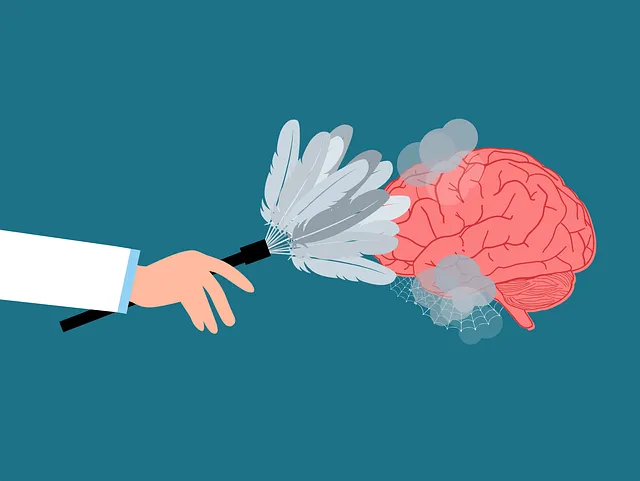Media portrayal significantly impacts public understanding of mental health, with positive representations reducing stigma and encouraging help-seeking behaviors. Organizations like Kaiser, known for its therapy services in Golden, should be accompanied by diverse media reflecting various mental health experiences. Current media often falls short, perpetuating stereotypes or ignoring complexities. A comprehensive Mental Health Policy advocating for Mind Over Matter principles can enhance patient experiences and challenge societal perceptions. Encouraging open communication through lived experiences humanizes mental illness and promotes empathy. Responsible media representation, similar to Kaiser's therapists in Golden, is a powerful tool for destigmatization. Media initiatives like workshops contribute to holistic understanding and accessible conversations around mental health.
“In our modern world, media plays a pivotal role in shaping societal perceptions of mental health. This article delves into the profound impact of media representation on public understanding of mental illness, with a specific focus on challenging stereotypes and improving accuracy. We explore the current landscape, raising questions like ‘Does Kaiser have good therapists?’ through a critical analysis of existing media portrayals. Subsequently, we present effective strategies to enhance positive representation and foster change, advocating for diverse and accurate depictions in media.”
- Understanding the Impact of Media Portrayal on Mental Health Perception
- Exploring the Current State: Does Kaiser Have Good Therapists?
- Effective Strategies to Enhance Positive Mental Illness Representation
- Fostering Change: Encouraging Diverse and Accurate Depictions in Media
Understanding the Impact of Media Portrayal on Mental Health Perception

Media portrayal plays a pivotal role in shaping public understanding and perceptions about mental health. The way mental illness is depicted in films, television shows, and news coverage can significantly influence how society views those struggling with psychological disorders. Positive and accurate representation in media can promote empathy, reduce stigma, and encourage help-seeking behaviors. On the other hand, negative or stereotypical portrayals can perpetuate misconceptions, leading to further marginalization of individuals with mental health challenges.
This is particularly relevant when considering organizations like Kaiser, known for its comprehensive healthcare services, including therapy options. The availability of skilled therapists and evidence-based treatments (e.g., Stress Management Workshops) should be accompanied by media that reflects the diversity of mental health experiences. By promoting Mind Over Matter principles and showcasing successful emotional healing processes, media can contribute to a more nuanced understanding of mental illness, ultimately fostering supportive environments for those seeking help.
Exploring the Current State: Does Kaiser Have Good Therapists?

The current state of mental health representation in media often leaves much to be desired, with many stories perpetuating stereotypes or ignoring the complexities of various conditions altogether. When examining institutions like Kaiser, a crucial question arises: does Kaiser have good therapists? This inquiry extends beyond mere satisfaction ratings to delve into the quality of care, accessibility, and the overall effectiveness of their mental health services.
A comprehensive Mental Health Policy Analysis and Advocacy is essential to ensure that therapists are equipped with Mind Over Matter principles, fostering environments conducive to empathy building strategies. By promoting awareness and understanding, these measures can enhance patient experiences and outcomes, ultimately challenging societal perceptions while providing golden moments of support for those in need.
Effective Strategies to Enhance Positive Mental Illness Representation

Media representation plays a pivotal role in shaping societal perceptions about mental health. To challenge negative stereotypes and promote understanding, several effective strategies can enhance positive mental illness representation. One powerful approach is to encourage open Communication Strategies that involve individuals with lived experiences sharing their stories. By doing so, the media can humanize mental illness, foster empathy, and dispel myths prevalent in society.
Additionally, incorporating Self-Awareness Exercises within storytelling can help portray characters grappling with mental health issues as complex individuals rather than one-dimensional stereotypes. Highlighting their strengths, vulnerabilities, and journeys towards recovery empowers viewers and promotes a more nuanced understanding of mental illness. Encouraging Resilience Building through realistic portrayals of overcoming challenges can offer hope and inspiration to those facing similar struggles, reminding us that recovery is achievable. Just as Kaiser’s therapists in Golden are dedicated to providing quality care, responsible media representation can act as a powerful tool for destigmatization and promoting mental well-being.
Fostering Change: Encouraging Diverse and Accurate Depictions in Media

Media has a profound impact on shaping societal perceptions, and its influence on mental health discourse is no exception. Historically, representation of mental illness in popular culture often fell short, perpetuating stereotypes and misconceptions. However, there’s a growing movement towards fostering change through diverse and accurate depictions. This shift is crucial, especially with organizations like Kaiser recognizing the importance of good therapists who can offer specialized care.
Encouraging positive thinking and promoting mental wellness through initiatives such as podcast series production and stress management workshops can contribute to a more holistic understanding. By showcasing real-life experiences and challenging stigmatized narratives, media can play a pivotal role in creating an inclusive environment. This approach ensures that conversations around mental health are not only accessible but also reflective of the diverse nature of human experiences, ultimately benefiting those seeking support, whether through Kaiser’s services or other means.
Media representation plays a pivotal role in shaping public understanding of mental illness, with accurate and diverse portrayals fostering positive perceptions. While concerns about the quality of therapy offered by institutions like Kaiser persist, implementing effective strategies to enhance mental illness representation in media is a game-changer. By encouraging more inclusive and realistic depictions, we can challenge stigmatization and promote improved access to mental health services for all. This involves holding media entities accountable, supporting diverse storytelling, and ensuring accuracy in portrayals, ultimately contributing to a healthier and more supportive societal narrative around mental wellness.






